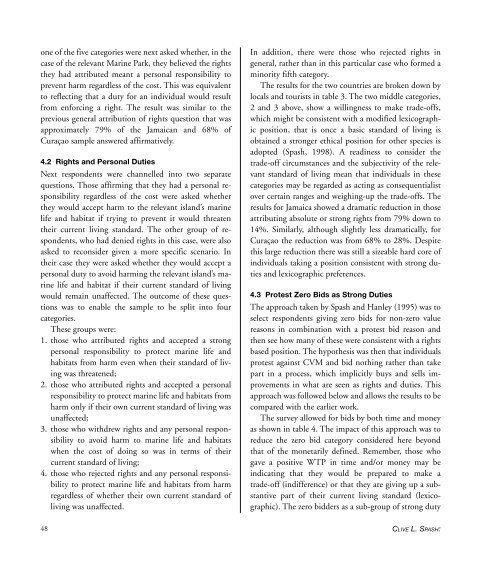You also want an ePaper? Increase the reach of your titles
YUMPU automatically turns print PDFs into web optimized ePapers that Google loves.
one <strong>of</strong> the five categories were next asked whether, in the<br />
case <strong>of</strong> the relevant Marine Park, they believed the rights<br />
they had attributed meant a personal responsibility to<br />
prevent harm regardless <strong>of</strong> the cost. This was equivalent<br />
to reflecting that a duty for an individual would result<br />
from enforcing a right. The result was similar to the<br />
previous general attribution <strong>of</strong> rights question that was<br />
approximately 79% <strong>of</strong> the Jamaican and 68% <strong>of</strong><br />
Curaçao sample answered affirmatively.<br />
4.2 Rights and Personal Duties<br />
Next respondents were channelled into two separate<br />
questions. Those affirming that they had a personal responsibility<br />
regardless <strong>of</strong> the cost were asked whether<br />
they would accept harm to the relevant island’s marine<br />
life and habitat if trying to prevent it would threaten<br />
their current living standard. The other group <strong>of</strong> respondents,<br />
who had denied rights in this case, were also<br />
asked to reconsider given a more specific scenario. In<br />
their case they were asked whether they would accept a<br />
personal duty to avoid harming the relevant island’s marine<br />
life and habitat if their current standard <strong>of</strong> living<br />
would remain unaffected. The outcome <strong>of</strong> these questions<br />
was to enable the sample to be split into four<br />
categories.<br />
These groups were:<br />
1. those who attributed rights and accepted a strong<br />
personal responsibility to protect marine life and<br />
habitats from harm even when their standard <strong>of</strong> living<br />
was threatened;<br />
2. those who attributed rights and accepted a personal<br />
responsibility to protect marine life and habitats from<br />
harm only if their own current standard <strong>of</strong> living was<br />
unaffected;<br />
3. those who withdrew rights and any personal responsibility<br />
to avoid harm to marine life and habitats<br />
when the cost <strong>of</strong> doing so was in terms <strong>of</strong> their<br />
current standard <strong>of</strong> living;<br />
4. those who rejected rights and any personal responsibility<br />
to protect marine life and habitats from harm<br />
regardless <strong>of</strong> whether their own current standard <strong>of</strong><br />
living was unaffected.<br />
In addition, there were those who rejected rights in<br />
general, rather than in this particular case who formed a<br />
minority fifth category.<br />
The results for the two countries are broken down by<br />
locals and tourists in table 3. The two middle categories,<br />
2 and 3 above, show a willingness to make trade-<strong>of</strong>fs,<br />
which might be consistent with a modified lexicographic<br />
position, that is once a basic standard <strong>of</strong> living is<br />
obtained a stronger ethical position for other species is<br />
adopted (Spash, 1998). A readiness to consider the<br />
trade-<strong>of</strong>f circumstances and the subjectivity <strong>of</strong> the relevant<br />
standard <strong>of</strong> living mean that individuals in these<br />
categories may be regarded as acting as consequentialist<br />
over certain ranges and weighing-up the trade-<strong>of</strong>fs. The<br />
results for Jamaica showed a dramatic reduction in those<br />
attributing absolute or strong rights from 79% down to<br />
14%. Similarly, although slightly less dramatically, for<br />
Curaçao the reduction was from 68% to 28%. Despite<br />
this large reduction there was still a sizeable hard core <strong>of</strong><br />
individuals taking a position consistent with strong duties<br />
and lexicographic preferences.<br />
4.3 Protest Zero Bids as Strong Duties<br />
The approach taken by Spash and Hanley (1995) was to<br />
select respondents giving zero bids for non-zero value<br />
reasons in combination with a protest bid reason and<br />
then see how many <strong>of</strong> these were consistent with a rights<br />
based position. The hypothesis was then that individuals<br />
protest against CVM and bid nothing rather than take<br />
part in a process, which implicitly buys and sells improvements<br />
in what are seen as rights and duties. This<br />
approach was followed below and allows the results to be<br />
compared with the earlier work.<br />
The survey allowed for bids by both time and money<br />
as shown in table 4. The impact <strong>of</strong> this approach was to<br />
reduce the zero bid category considered here beyond<br />
that <strong>of</strong> the monetarily defined. Remember, those who<br />
gave a positive WTP in time and/or money may be<br />
indicating that they would be prepared to make a<br />
trade-<strong>of</strong>f (indifference) or that they are giving up a substantive<br />
part <strong>of</strong> their current living standard (lexicographic).<br />
The zero bidders as a sub-group <strong>of</strong> strong duty<br />
48 CLIVE L. SPASH:


















